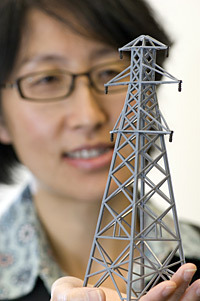Royal Society award boosts micro energy generation
A professor at the University of Bath has been awarded an esteemed Wolfson Research Merit Award from the Royal Society for her work in the field of low-carbon research.
Professor Furong Li, from the university’s Department of Electronic & Electrical Engineering, is one of just 24 new award holders announced by the UK’s national academy of science.

The award recognises Professor Li’s research contribution aimed at accelerating the UK’s move towards low-carbon living. Her work aims to reduce the cost of integrating renewable energy systems and the use of cost-reflective economic incentives to shape future energy use. She is also working to facilitate the development of highly flexible, interactive and cost-effective smart grids.
Professor Li’s work has led to the development of pricing methods that promote efficient energy network development that will meet customer needs. As a result, 80% of the UK’s distribution network operators have adopted her methodology and the way the UK’s electricity network is managed has been fundamentally changed.
Professor Li’s work has also triggered a wide review of transmission and distribution pricing across the world, including Brazil, Ireland, India and China. She has been invited to share her work with Brazilian and Lithuanian energy regulators and will be leading a delegation to India in February aimed at exploring an economically efficient charging method that will also be socially acceptable.
The Wolfson Merit award will allow Professor Li to focus on mapping out the current energy network infrastructure across the UK, highlighting areas which most lend themselves to microgeneration and home energy management. She will work with the government and network operators to develop incentives in these regions aimed at increased public uptake of microgeneration technologies.
Professor Li said: “A key element of any solution to decarbonise our electricity generation will be microgeneration, where individual households use technologies such as solar panels, wind turbines, combined heat and power methods and home energy storage to generate some of their own power from renewable sources, which they will consume and store when the price is at its cheapest.”
The five-year award is funded by the Wolfson Foundation and the Department for Business, Innovation and Skills. The Wolfson Foundation is a grant-making charity, established in 1955, which provides funding to support excellence.
Rethinking IT sustainability
As businesses rethink how they manage their IT infrastructure, embedding sustainability into...
Emissions as data: the challenge of reporting on an invisible metric
The challenge many businesses face is quite apparent: how does one measure emissions? AVEVA says...
The 3 key risks directors need to manage amid climate reporting uncertainty
2025 will be a marker year for climate reporting, and boards should devote attention to three key...










